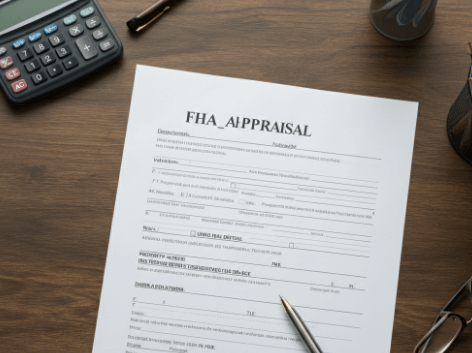Understanding the intricacies of property appraisals, especially those related to FHA loans, is crucial. This blog will explore the essential topic of ‘FHA Appraisal Red Flags in Florida.’ Understanding these red flags is not just important; it’s essential for buyers and sellers. It ensures that transactions proceed smoothly and properties meet the stringent requirements set by the Federal Housing Administration. Join us as we uncover the common FHA Appraisal Red Flags in Florida, helping you to be better prepared and informed in your real estate journey.
Real estate investors Steve Daria and Joleigh have frequently encountered various FHA appraisal red flags in their extensive experience in the Florida market. Typical issues they have observed include inadequate property conditions, unpermitted additions, and failure to meet safety standards. Buyers and sellers can better navigate the FHA appraisal process and avoid potential pitfalls by being aware of these red flags.
Understanding the FHA Appraisal Process
Before discussing the FHA appraisal red flags in Florida, it’s crucial to understand that FHA appraisals evaluate a property’s safety, soundness, and security for potential borrowers.
Unlike conventional appraisals, FHA appraisals adhere to HUD’s Minimum Property Standards (MPS), which outline federal home safety and functionality requirements.
Familiarizing oneself with these standards is paramount to navigating the appraisal process successfully.

Common FHA Appraisal Red Flags in Florida
Several issues can raise red flags during an FHA appraisal, potentially impacting the transaction’s outcome.
Specific concerns in Florida’s real estate market warrant careful attention to ensure a smooth appraisal process and transaction.
1. Faulty Roofing and Drainage
Florida’s climate can be challenging, especially during heavy rains and windy conditions.
Missing shingles, leaks, or inadequate drainage systems can signal potential water damage issues.
2. Mold and Mildew
Florida’s high humidity levels create a conducive environment for mold and mildew growth, which are common concerns for property appraisers.
Signs of mold or mildew growth due to Florida’s high humidity levels can affect property value and occupant health.
3. Electrical and Plumbing Issues
Outdated or malfunctioning electrical and plumbing systems pose safety risks and may lead to appraisal concerns.
4. Safety Hazards
Unsecured decks or loose handrails pose safety risks for occupants and can halt the appraisal process.
5. Pest Infestations
The subtropical environment in Florida provides the perfect breeding ground for various pests.
Termite or ant infestations are common in Florida and can lead to structural damage, raising appraisal concerns.
6. Structural Integrity Concerns
Cracks in the foundation or bulging walls indicate potential structural issues that require further inspection.
Get An Offer Today, Sell In A Matter Of Days…
Proactive Solutions for Dealing with FHA Appraisal Red Flags in Florida
Preparation is critical to addressing potential red flags and ensuring a favorable appraisal outcome.
By taking proactive measures, property owners can mitigate concerns and increase the likelihood of a successful appraisal.
Prioritize Repairs and Renovations
Addressing known issues before the appraisal, such as leaky faucets or faulty circuits, demonstrates proactive maintenance.
Investing in Professional Maintenance
Hiring professionals for roofing, plumbing, and electrical work ensures quality repairs that meet FHA standards.
Clearing Up Clutter
Removing clutter allows the appraiser to evaluate the property accurately and showcase proper maintenance.
Documenting Repairs
Keeping detailed records of repairs and maintenance provides evidence of the property’s upkeep and addresses appraiser concerns.
Strategies for Dealing with Identified FHA Appraisal Red Flags in Florida
Despite proactive efforts, some red flags may still arise during the appraisal process.
Addressing these issues can help navigate potential challenges and ensure a successful transaction.
Getting a Second Opinion
Requesting a follow-up inspection by another FHA-approved appraiser can provide a fresh perspective on identified issues.
Offering Insurance and Warranties
Providing additional insurance or warranties can alleviate appraiser concerns and assure lenders of the property’s long-term viability.
Seeking Reparation Estimates
Obtaining repair estimates for minor issues demonstrates a commitment to rectifying concerns promptly.
Tips for Enhancing the FHA Appraisal Experience
Maximizing the appraisal experience requires proactive measures, staying informed, and fostering open communication with all involved parties.
Staying Informed and Proactive
Keeping abreast of changes in FHA guidelines allows property owners to adjust their management strategy accordingly.
Utilizing Professional Assistance
Real estate agents and property managers can offer invaluable advice and services to prepare properties for appraisal.

Maintaining Communication
Transparent communication with the appraiser and lending institution fosters trust and ensures a smooth appraisal process.
FAQs for Revealing FHA Appraisal Red Flags in Florida
In this section, we address common questions and concerns regarding potential appraisal issues for FHA-approved properties in Florida.
What happens if the FHA appraiser identifies red flags during the appraisal?
If the appraiser identifies red flags during the FHA appraisal, the buyer and seller must negotiate who will address the required repairs.
Can an FHA loan be denied based on the appraisal?
Yes, an FHA loan can be denied if the appraisal reveals significant issues that render the property uninhabitable or if the appraised value falls below the agreed purchase price, affecting the loan-to-value ratio.
Ensuring that the property meets all FHA standards is crucial for loan approval.
How long is an FHA appraisal valid in Florida?
An FHA appraisal is typically valid for 120 days in Florida.
However, if the loan does not close within this period, a new appraisal may be required to ensure the property’s condition and market value remain accurate.
Are there any costs associated with an FHA appraisal?
Yes, there are costs associated with an FHA appraisal, which the buyer generally pays.
The fee can vary depending on the property’s location and complexity but typically ranges between $300 and $500.
How can I find an FHA-approved appraiser in Florida?
You can find an FHA-approved appraiser in Florida through the HUD directory of approved appraisers.
Additionally, your lender will often have a list of trusted and approved appraisers to recommend for the process.
Conclusion
Navigating FHA appraisals in Florida’s real estate market requires diligence, preparation, and a proactive approach. Property owners can increase the probability of a successful transaction by understanding potential red flags, addressing issues proactively, and maximizing the appraisal experience. With attention to detail and strategic planning, FHA appraisal red flags in Florida need not be a source of anxiety but an opportunity to showcase the value and desirability of properties in the Sunshine State’s vibrant real estate market.
**NOTICE: Please note that the content presented in this post is intended solely for informational and educational purposes. It should not be construed as legal or financial advice or relied upon as a replacement for consultation with a qualified attorney or CPA. For specific guidance on legal or financial matters, readers are encouraged to seek professional assistance from an attorney, CPA, or other appropriate professional regarding the subject matter.

